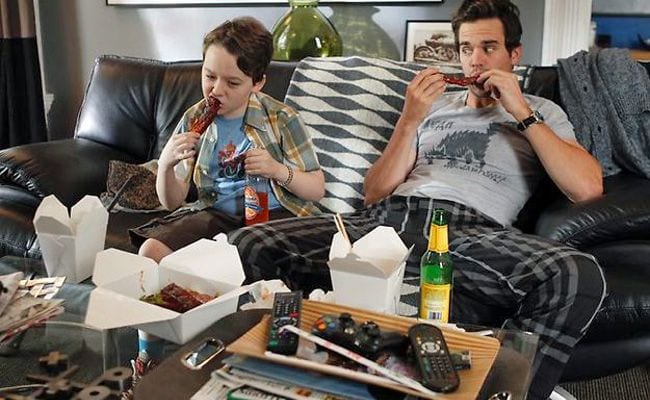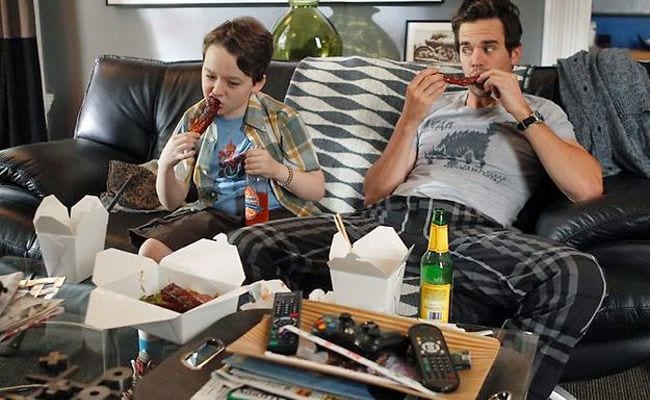
The suitably named Will Freeman (David Walton) doesn’t care much for commitment or human attachment. The opening moments of NBC’s new comedy About a Boy feature the unemployed, San Francisco-based bachelor expressing disgust at the idea of even fleetingly caring for the children of his friend Andy (Al Madrigal) before leaping from a cable car to chase down a “hot chick with a cello” (Leslie Bibb). He lies liberally to get into her pants, including attending a single parents’ group with her and inventing a son with leukemia to score sympathy points.
A convenient cover for Will’s inventions presents itself in the form of a precocious but sheltered 11-year-old boy named Marcus (Benjamin Stockham) who moves in next door with his hippie-dippy mother (Minnie Driver). Marcus plays the role of Will’s son to facilitate the latter’s romantic ambition regarding the woman with the cello, but the arrangement leads to an unlikely friendship that threatens to surmount Will’s defenses of detached independence.
Developed for television by Friday Night Lights head writer Jason Katims, with a pilot directed by Jon Favreau (the first episode airs as a special ad-free premiere after NBC’s Olympic coverage on Saturday, 22 March), About a Boy is the third relocation of British writer Nick Hornby’s novels to a Stateside setting and the first to attempt the transition to the small screen. The first two were the much-appreciated John Cusack film version of the music-geek classic High Fidelity and the Jimmy Fallon vehicle Fever Pitch, in which the Farrelly brothers translated Hornby’s semi-autobiographical passion for London’s Arsenal Football Club to Boston Red Sox fandom in the (serendipitous) World Series title season of 2004. One would be remiss not to mention that Hollywood already tackled About a Boy itself a decade ago, preserving the novel’s London setting and casting Hugh Grant as Will.
Given Hornby’s front-and-centre wit and pop-culture-centric discourse, it’s easy to overlook that all of these novels, and About a Boy in particular, are classically structured examples of the literary bildungsroman, or coming-of-age saga of formation and education. Hornby’s wry modern twist on the genre is to make his male protagonists who are “coming of age” adults who cling to cultural obsessions redolent of immature boys. These man-children learn to compromise on their motivating interests enough to allow room for reciprocal adult relationships and achieve the delicate balance of sacrifice and reward that we’ve chosen to call happiness.
This structure is much more adaptable to American network comedy than it might initially seem. In the format of the television sitcom, the bildungsroman loses the familiar arc of a gradual forward motion in favor of incremental maturation and relapse. Will and Marcus “grow up” together in bite-sized portions, learning to put away their respective childish things in the course of each episode’s conflict and resolution before returning to their original character profile in time for next week’s installment. Moreover, Hornby’s man-children (the title is simultaneously referring to both of them) have plenty of company in an American context; indeed, mainstream American comedy is largely the hegemonic domain of the self-centered, irresponsible young male.
The premiere of About a Boy condenses the novel’s plot into a half-hour, focusing on the meeting of Will and Marcus, their adoption of each other as non-traditional friends, and the latter’s socially disastrous decision to sing a song by boy band One Direction at his new school’s talent show. Stockham imparts Marcus’ oddness gently but naturally and is a disarming foil for the appealingly relaxed Walton. Both spark with the putative authority figure played by Driver, whose tie-dyed free spirit leanings actually leave her more constrained than Will, unencumbered as he is from the drudgery but also the routine of steady employment by the lucrative royalties of an irritating Christmas tune he wrote.
This aspect of Will Freeman may be the most drastic non-geographic shift the show takes with the original material. The 2002 feature film placed Grant’s easy irony and sarcasm at the forefront. His Will was a man-as-island who had to be heavily coaxed to have contact with anyone, period. Walton’s Will is more jovial and goofy, a ladies’ man with at least one good and honest friend his own age in Andy.
He’s also the primary reason to give NBC’s About a Boy any sort of chance to develop its formula, based as loosely as it is on a popular example of a dry-sounding literary genre with a German name. Hornby and Grant’s Will was a misanthrope who needed to be gently reintroduced to the virtues of human connection. Walton’s is more of a dude you might want to be around, even if you find him ultimately exasperating. But he’s the engine of this particular show, and may be enough to fuel a healthy run.

